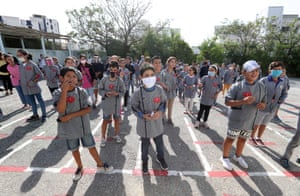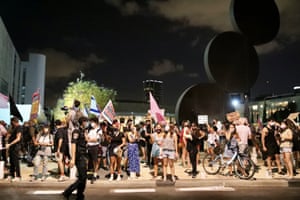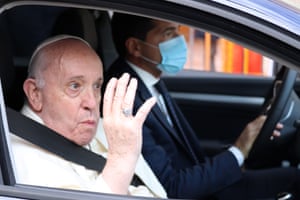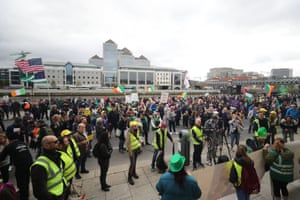
Brazil on Saturday registered 599 new coronavirus deaths and 26,310 new confirmed cases, the health ministry said.
The country now has a total of 145,987 dead due to the coronavirus and 4,906,833 confirmed cases, making it the second worst affected country globally, after the US and before India, which has the third highest death toll in the world.

A view of Taruman Park Cemetery used to bury coronavirus (Covid-19) victims is seen as death toll rises due to the pandemic in Manaus, Amazonas, Brazil on 3 October, 2020. Photograph: Anadolu Agency/Getty Images
The former New Jersey governor Chris Christie has checked himself into a hospital Saturday afternoon as a precautionary measure after announcing earlier in the day that he had tested positive for coronavirus.
Christie, who has asthma, said he decided it was best to be monitored in hospital, after a consultation with his doctor.
Governor Christie
(@GovChristie)In consultation with my doctors, I checked myself into Morristown Medical Center this afternoon. While I am feeling good and only have mild symptoms, due to my history of asthma we decided this is an important precautionary measure.
He reported having a slight fever and aches but said he felt well enough to drive himself to the hospital.
Though he said his breathing is fine, Christie told CNN he had started a course of the Covid-19 treatment remdesivir after being admitted.
Christie had previously helped president Donald Trump in his preparation for debates with challenger Joe Biden.
This from the BBC’s Emily Maitlis:
emily m
(@maitlis)Chris Christie – ie former NJ governor – was helping DJT with his debate prep – taking on role of Joe Biden. So was in close contact with the president –
Updated
at 6.23pm EDT
Hundreds of protesters opposed to mask wearing and other coronavirus measures gathered at a lakeside town in southern Germany on Saturday for rallies that were smaller than planned.
The gathering in the city of Konstanz on the border with Switzerland fell far short of the expected 15,000 people, with police saying roughly 1,000 had arrived in the area and all the events had passed off peacefully.
Similar events in August in Berlin – attended by a mix of the extreme left and right, anti-vaccination campaigners, conspiracy theorists and self-described free thinkers – had attracted roughly 20,000 people.

A demonstrator holds up a placard reading ‘Fake news – Trump tested positive’ to protest against masks and virus restrictions during the ongoing Covid-19 pandemic in Konstanz, southern Germany. Photograph: Sébastien Bozon/AFP/Getty Images
Germany enforces similar rules to many other European countries, obliging people to wear masks on public transport and keep 1.5 metres (five feet) apart where possible are among the most prominent.
But the country has consistently had a lower rate of infection than most of its neighbours and has managed to avoid the kind of restrictive blanket lockdowns seen in Spain and Italy.
“People need to think a bit more about this… and not be so afraid of nature because viruses and bacteria are part of nature,” one participant, Ella, 51, told AFP.
Police were out in force to patrol the rallies after one of the previous gatherings saw groups of protesters try to break into the parliament building in Berlin.
The rallies have also caused outrage after images showed some participants with Nazi insignia.
Updated
at 5.58pm EDT
Tunisian authorities will ban all gatherings and reduce working hours for employees in the public sector in order to stop the rapid spread of the coronavirus, prime minister Hichem Mechichi said on Saturday.
The decision was taken amid strong fears that hospitals in the North African nation will be unable to cope with a high number of patients because of the shortage of intensive-care beds.
The total number of coronavirus cases has jumped to more than 20,000 compared with roughly 1,000 cases before the country’s borders were reopened on 27 June.

Children at a school in Tunis, Tunisia. According to the Tunisian Ministry of Health coronavirus cases are on the rise, which prompted the government to impose a night curfew in Monastir and Sousse provinces until 15 October. Photograph: Mohamed Messara/EPA
In a speech announcing the latest measures to combat the virus, Mechichi said he gave orders to Tunisia’s governors to implement a regional lockdown if necessary.
But he added it was unthinkable to reimpose a nationwide lockdown because of the unprecedented economic collapse caused by the first lockdown in March.
Tunisia’s tourism-dependent economy shrank 21.6% in the second quarter compared to the same period last year as a result of the pandemic and measures to curb it, Reuters reports.
Updated
at 5.55pm EDT
A spokesperson for the UK’s Department of Health and Social Care has told the Guardian that the government currently does not know exactly how many new infections were recorded in the past 24 hours.
They said “some new data” would be published over the next couple of days, “but currently, we do not have a breakdown showing which cases are from today and which from a previous period”.
A technical issue resulting in conflated old and new test results was blamed, and the spokesperson said this would affect reported cases for a number of days. “This issue does not affect people receiving their Covid-19 test results. All people who tested positive have received their Covid-19 test result in the normal way,” they added.
The delayed results all refer to positive cases identified between 24 September and 1 October.
“The issue will affect the total new cases published on the Covid-19 dashboard over the coming days, which will be updated to provide accurate data on the total number of positive cases over this period,” the spokesperson added.
Updated
at 4.30pm EDT
UK reports staggering 12,872 new infections in one day
The UK reported 12,872 new coronavirus cases in the 24 hours to Saturday, nearly double the number reported a day earlier.
On Friday, the government had reported 6,968 new infections.
The figures, normally released daily at 4pm GMT, were only published just before 9pm on Saturday.
A government website blamed a “technical issue”, which has now been resolved, for “a delay in publishing a number of Covid-19 cases to the dashboard in England. This means the total reported over the coming days will include some additional cases from the period between 24 September and 1 October, increasing the number of cases reported.”
This from the Labour MP Justin Madders:
Justin Madders MP
(@justinmadders)12,872 new cases today,but a note says “Due to a technical issue…the total reported over the coming days will include some additional cases from the period between 24 Sept and 1 Oct”
Does this mean local lockdowns have been missed because these cases were? What a shambles.
Updated
at 4.14pm EDT
Thousands of Israelis protested again across the country on Saturday, flouting a new law meant to curb anti-government demonstrations during a new national coronavirus lockdown.
The street protests, just three days after parliament approved an edict to limit the scope of such demonstrations, kept pressure on prime minister Benjamin Netanyahu over his handling of the coronavirus crisis and over allegations of corruption, which he denies.
The new law bans Israelis from holding demonstrations more than 1km (about half a mile) from their homes and forces stricter social distancing, a measure the government said was aimed at curbing Covid-19 infections.

Anti-Netenyahu protests continue in Israel on 3 October, 2020. Photograph: Anadolu Agency/Getty Images
Critics have called it a blow to freedom of speech.
Most protests on Saturday night were small and scattered throughout the country, though a crowd of thousands gathered in Tel Aviv.
A small number of protesters scuffled with police and tried to block city streets. About 15 people were arrested, a police spokesman said, according to Reuters.
Israel has shut down much of its economy and instructed people to stay within a kilometre of their homes whenever possible in an effort to contain a second-wave surge in coronavirus infections.
Updated
at 3.57pm EDT
Pope Francis on Saturday made his first trip since the Vatican’s coronavirus lockdown, though it was a solitary affair for the crowd-loving Argentine due to pandemic precautions.
Francis visited the central Italian town of Assisi, the birthplace of his namesake saint, where he signed his new encyclical – a document laying out the pope’s views on key issues – called “Fratelli tutti” on the importance of fraternity and social friendship, particularly during the pandemic.
The pope’s last trip was to the southern Italian port city of Bari on 23 February for a meeting with Mediterranean bishops, AFP reports.
As the virus began to spread around the world earlier in the year, Francis instead reached out through a live-streamed mass, performed alone on Saint Peter’s Square.
“Thick darkness has gathered over our squares, our streets and our cities,” he said in the historic March address, describing the coronavirus “tempest” as having put everyone “in the same boat”.

Pope Francis waves from the seat of a car as he leaves the lower Basilica of San Francesco, in Assisi, Italy, on 3 October 2020. Photograph: Gianluigi Basilietti/EPA
Updated
at 3.24pm EDT
Dominic Raab, the UK foreign secretary, has said he was worried that Boris Johnson would die after the prime minister was taken into intensive care with coronavirus in April.
Raab, who stood in for Johnson when he became unwell, told the Conservative party conference on Saturday that he was often asked how he felt during that time, and admitted he was “really worried that we might lose him”.
He said coronavirus had affected every community and nearly taken the life of Johnson, whom he called a “friend as well as a leader”.
My colleague Sarah Marsh reports.
Ireland is seeing a “significant escalation” in coronavirus infections, the acting chief medical officer said on Saturday after reporting the highest daily death toll since May and the third-highest number of daily cases recorded to date.
Like most of Europe, Ireland has seen a steady increase in infections since the end of July and has tightened restrictions as a result, including banning all indoor restaurant dining and most trips in and out of the capital, Dublin, Reuters reports.
The 613 new cases on Saturday was the highest daily total since late April, when the country was still in a full lockdown.
Ten more people died, bringing the total number of coronavirus-related deaths to 1,810.
“The numbers being reported today and over the past week represent a significant escalation in the profile of Covid-19 in Ireland,” acting chief medical officer Ronan Glynn said in a statement.
Glynn urged people over the age of 70 and those who are medically vulnerable to Covid-19 to limit the number of people they meet to a very small core group of family members, carers or friends, and for short periods of time.
Ireland has reported just over 100 cases per 100,000 people in the past 14 days, the 16th-highest Covid-19 infection rate out of 31 European countries monitored by the European Centre for Disease Control.

People attend an anti-mask protest organised by Health Free Ireland at Custom House in Dublin on Saturday, 3 October, 2020. Photograph: Niall Carson/PA
Updated
at 2.39pm EDT
France reports record 16,972 new infections in one day
France reported 16,972 new confirmed cases over the past 24 hours on Saturday, a new daily record, as well as 49 new deaths.
Saturday’s daily toll is 4,824 cases higher than Friday’s 12,148, which was lower than Thursday’s 13,970 and well below highs of more than 16,000 recorded last week.
There were 4,087 new cases of people being hospitalised over the last seven days, including 849 in intensive care units.
The rate of positive coronavirus tests in France rose to 7.9% from 7.7% on Friday.
Updated
at 4.38pm EDT
Ukraine’s former president Petro Poroshenko has been hospitalised in Kiev with double pneumonia, days after he tested positive for Covid-19, AFP reports.
“Petro Oleksiyovych [Poroshenko] was hospitalised,”, his wife, Maryna Poroshenko, said in a video on Facebook. “Despite the fact that my husband has double pneumonia, he is strong-willed and is demonstrating this in the fight against the disease.”
Poroshenko, 55, announced on Tuesday that he had tested positive for coronavirus and said he was receiving treatment at home.
Poroshenko, who is currently a member of the Ukrainian parliament, suffers from diabetes, which is associated with an increased risk of developing complications from the coronavirus.
He led Ukraine after Russia’s 2014 annexation of the Crimean peninsula and the outbreak of a conflict with Moscow-backed separatists in the east of the country. In 2019 he was easily beaten in presidential elections by Volodymyr Zelensky, a comedian with no previous political experience.
Ukraine, one of Europe’s poorest countries, with a population of 40 million, has reported more than 222,000 cases of coronavirus and more than 4,300 fatalities.
Former prime minister Yulia Tymoshenko and Zelensky’s wife both contracted the virus, but have recovered.
Updated
at 1.36pm EDT
This from Politico’s Gabby Orr:
Gabby Orr
(@GabbyOrr_)So less than 5 minutes after the president’s doctor said he has been doing just fine, Trump’s own chief of staff appears to give the pool an entirely different account — off the record. https://t.co/fTY2raDFta


